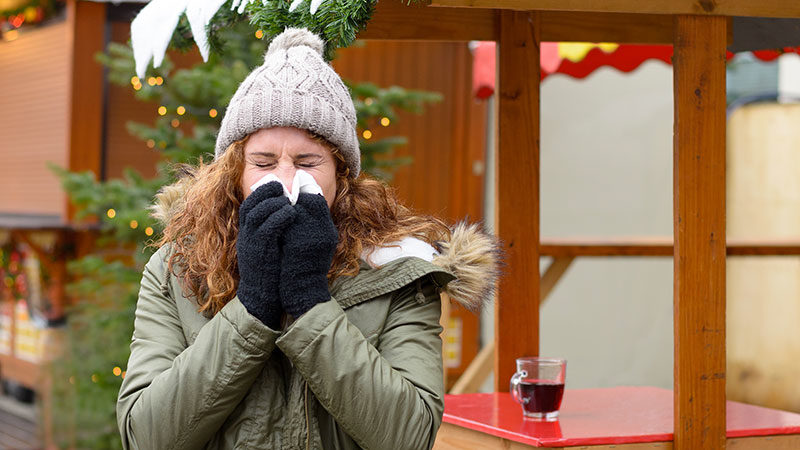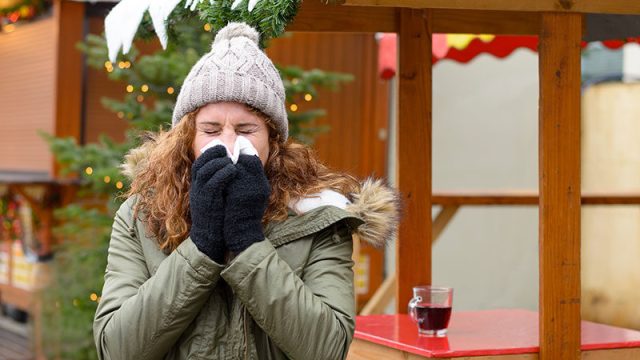
Tis the season for Christmas trees, poinsettias, mistletoe and scented candles. But if your nose looks like Rudolph’s, it’s a little hard to feel jolly. Although allergies typically peak in the spring and fall, the holidays may surprise sensitive sufferers with a gift of unexpected triggers. Here are five holiday allergens and allergy triggers, along with some advice to help you stay merry and healthy during the holiday season—not sneezing, coughing or scratching.
Holiday Allergy Trigger #1: Christmas Trees
Mold is the biggest problem with live Christmas trees. Often, they are cut in advance and kept in humid environments, promoting mold spore growth. Within just two weeks of bringing a tree into your home, indoor mold counts can increase significantly, according to one study.
The sap contains terpene and other substances that can irritate skin and mucous membranes; and pollen stuck to the tree may be released inside and lead to reactions, so you make think an artificial version is better, BUT they could harbor dust and mold from their time in storage, also triggering allergies.
Precautions: Slip on gloves and wear long sleeves when handling your fresh tree to avoid the sap coming into contact with your skin. Before schlepping your tree inside, give it a good shake (or a blast with a leaf blower) and spray it down with a garden hose (especially the trunk) to help remove some of the pollen and mold. Then sit the stump in a bucket of water and let the tree dry for few days on a covered porch or in a garage. For an artifical tree, give it a good wipe-down before decorating with lights and ornaments. Follow directions carefully when spraying artificial snow or flocking. Inhaling these sprays can irritate your lungs and trigger asthma symptom s (better to avoid altogether in my opinion).
Holiday Allergy Trigger #2: Festive Foods
The most common food allergens are milk, eggs, soy, fish, shellfish, peanuts, tree nuts, and wheat. Of those, peanuts and tree nuts will most often make it into holiday dishes without people knowing, and have the potential to cause severe reactions.
Precautions: : It’s a good idea to let your holiday host know about your food allergies; it’s important to ask about the ingredients in each dish; and it’s very nice to volunteer to bring something that’s safe for you, and shareable with others. But what’s crucial is to be prepared with an epinephrine auto-injector (Epi Pen), an emergency dose of antihistamine, and an inhaler if you have asthm. Learn which foods and recipes are unexpected sources of allergens at FoodAllergy.org and AAAAI.org.
Holiday Allergy Trigger #3: Cocktails
You raise a glass to your loved ones, your boss and colleagues, friends and neighbors, and even the strangers sitting next to you at a bar. There’s lots of celebrating at this time of year, but be mindful of what you’re using to toast. Some people may experience mild wheezing or other symptoms from the sulfites in wine, for example, and certain alcoholic beverages contain major food allergens.
Precautions: There aren’t good tests for sulfite sensitivity, but your reaction to dried fruit—high in this sulfur-based preservative—could be an indicator. Pay attention if you have asthma, as sulfites can trigger symptoms. Maraschino cherries contain small amounts of sulfites, as well. Stick with organic wine for a sulfite-free sip. Other triggers to be aware of: Tree nuts may be found specialty beers, particularly seasonal ales; milk is in Irish crème and white chocolate liqueurs; and egg whites may be used to add froth to specialty drinks.
Holiday Allergy Trigger #4: Travel
Staying in a hotel for the holidays may be wonderful, but not if you have allergies. Pillows and bedding can harbor a lot of dust mites. You may have difficulties with some of the detergents they use as well. If you will be staying with family, they’re pets may trigger your symptoms.
Precautions: Consider bringing her own pillow, or at least a dust mite cover for the pillow. Also make sure you get a nonsmoking room. If you’re allergic to your family’s pet, taking medicines with you. If possible, avoid petting the animal, and wash hands after direct contact.
Holiday Allergy Trigger #5: Stress
Be aware that stress can lead to asthma attacks. Chemicals released by the body during stressful times can cause the muscles around your airways to tighten, making it difficult to breathe.
Holiday Allergy Trigger, Bonus Round! Poinsettias
This festive plant is a member of the rubber tree family and contains compounds similar to those found in latex, so stay away if you have a latex allergy. Certain groups of people—such as healthcare workers and people with spina bifida who have had numerous surgeries—are more likely to be allergic to latex. One study Showed that 40% of latex-allergic individuals were also allergic to poinsettias.
The key is to be prepared and plan ahead. Consult with your doctor in advance.











